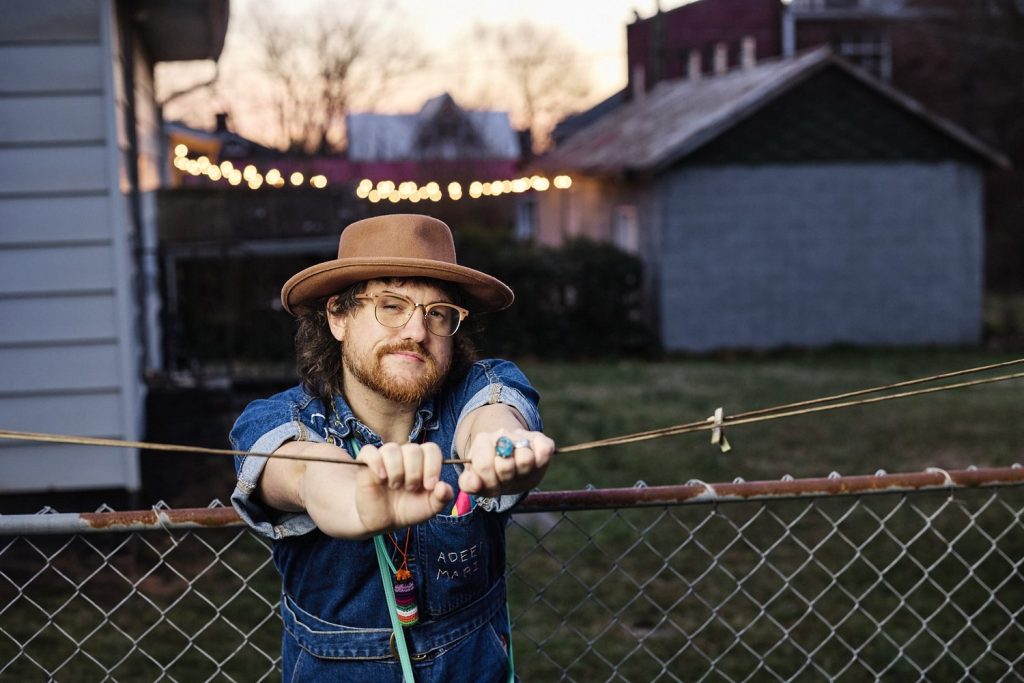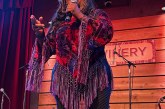
‘White Trash Revelry’ a breakout hit for Knoxville singer-songwriter
What does it mean to be a human being in modern society?
The unendingly tumultuous circumstances permeating modern life seem increasingly to find humankind spiraling out in a sort of collective existential identity crisis.
But in that fiery chaos, clarity often is forged. Purpose is found. Human beings find themselves, they find their missions and they find their people. Then they can fight, love and party together as the world burns. So while life can be hard and the deck is stacked against folks, with the right mindset, posse and soundtrack, there’s a lot of positive vibes available to a person when they really start feeling themselves.
Case in point: Adeem the Artist.
In both the lyrics and liner notes of “White Trash Revelry,” the Knoxville musician’s much-lauded 2022 follow-up to the previous year’s critically acclaimed “Cast-Iron Pansexual,” it’s clear that Adeem is continuing to work through some heavy things, such as attempting to reconcile their Southern, blue-collar upbringing with their progressive politics and artistic and intellectual evolution, undergone over years of self-taught discoveries and honorary degrees in the school of hard knocks.
Adeem the Artist made their name painstakingly in past iterations as a New York-based emo folk-punker; a drunk human jukebox serenading tourists on Caribbean cruises while forming a deep connection with their partner, painter Hannah Bingham, through an old-fashioned pen-pal romance; as an ambitious indie-folk performer label-shopping and working on licensing songs to TV and sleeping in the back of their hatchback on mini-tours; and, finally, as a generous scene builder in Knoxville and other Appalachian towns, throwing together showcases, emceeing events and even moonlighting as a cover artist in the initial transition to full-time musicianship.
Then, amidst a few years of world events featuring LGBTQ+ setbacks, police killings of unarmed Black citizens, mass shootings and a poorly managed global pandemic, a fire was re-lit under Adeem the Artist. They say that at that point they realized they still had more to do while there still was time. Bigger things to say. More of themself to become and grow into.
They took a long hard look in the existential mirror and publicly came out as pansexual and gender non-binary.
They examined and mined heartbreaking and inspiring moments in their sometimes-lonely private journey from a trailer park in Gastonia, North Carolina, 30 years ago all the way to the present and laid it bare on the raw, rowdy, gorgeous “Cast-Iron Pansexual.” It wasn’t the first recording the prolific songwriter had released, as they had dozens of tracks, EPs and albums credited to past names, but it was the first in this newly claimed identity, and it blazed so brightly that not only did Adeem the Artist shoot to the top of the local scene, they quickly surpassed the monetary goal in the fundraising campaign for the next album and they scored opening dates on tour for alt-country acts like American Aquarium and Rhett Miller of the Old 97’s.
Adeem realized they could help marginalized people with their newfound self-acceptance. As a result, they began writing for Country Queer, uplifting and shining a light on fellow LGBTQ+ performers, and aligned with groups like the Black Opry, the Virginia-based collective for marginalized songwriters. And finally, a spastic cry of jubilation arose from Adeem’s growing fanbase upon their signing with Thirty Tigers. Their gift and their hard work were being recognized, validated and about to be broadcast to a whole new audience.
In an autumn appearance with American Aquarium at the venerable Orange Peel in Asheville, North Carolina, still promoting “Cast-Iron” and previewing material from the new album, it was clear to longtime listeners that the artist on stage that night was better than ever but also seemed poised on the cusp of something even greater, while the newly initiated walked out feeling like they’d witnessed something special from an upcoming star.
In the intervening months, NPR, Billboard, Rolling Stone and many others have named “White Trash Revelry” to their year-end best-of lists. Brandi Carlile name-dropped Adeem on Sirius radio, extolling their virtues. Actor Vincent D’Onofrio, who had contributed to the Kickstarter campaign, tweeted about the album’s excellence. And Adeem was the subject of a full profile in the New York Times.
And now they have surpassed a million streams on Spotify. What’s next, a Grammy? Multiple Grammys? Anything seems possible at this moment. But whatever sparkle and sheen the newfound celebrity seems to add, the album release show at The Bird and The Book in Maryville in early December was even more revealing about where this machine is really headed.
Adeem essentially is a poor Southern queer kid brought up in a dysfunctional family, self-taught and self-made in the truest sense, with big beliefs and big dreams and an uncompromising and constantly evolving vision for what it means to be an artist, and a human being, in the modern age.
This much was apparent when BLANK first started writing about them around the time “Kyle Adem is Dead,” the work that welcomed the Adeem the Artist persona to the world, was self-released in 2016. Several earlier releases had wrestled with personal issues, waxed poetic and romanticized bohemia and activism in a more general way, but the Adeem moniker seemed to allow them the freedom to really blow up expectations of what folk could be and explore their purpose and potential responsibility with music. With that record, “The Birds” trilogy of EPs, multiple singles, a fun holiday song and some prominent slots in local festivals like Rhythm N’ Blooms, a very original, not oft-explored theme emerged: radical redneck progressivism.
Having moved away from the South and spent an awkward adolescence overcorrecting their Southern drawl and hillbilly habits, Adeem had Gatsby-ized themself in a manner for a time, self-teaching where they lacked formal education in order to present songs and online essays that showed sharp academic insight into economic and social issues. They had come up on country music in a trailer park in North Carolina but spent early adulthood in coffeeshops singing emo with painted nails. They flirted with ministry, serving as a chaplain at one point in New Jersey. They hit heavy depressions falling out with the faith and describe themselves consistently over the past several years as living in a state of “apostasy.” Yet their music and whole self sometimes feel more spiritual than any church could ever dream of being.
Having moved back to the South with Hannah and feeling like they came across more like a preachy, over-educated, big-city liberal, Adeem says they spent a lot of time reckoning with just who they were: Financial woes but strong macroeconomic opinions. Clear, sober outlook on the world with an artist’s heart to fix it. Anger for bigots, love for the downtrodden. Earnest heart covered with a quick, nasty wit. Songs like “Suicide Scars” emerged and demonstrated the deep empathy Adeem felt for young marginalized peoples, especially those in the generalized queer community, of which Adeem already had often hinted to friends (and to audiences on songs like “Midway Motel” that reference dalliances with boys) that they were a part.
They had a child with their partner and, publicly in their “Love Notes” book and posts about their child, they betrayed a certain wrestling with conventions and restrictions of potential parenthood and often wondered aloud online if there was a better or different way to do it.
Then in 2021 came the big come-out as non-binary on “Cast-Iron Pansexual.” The moonlighting as a rock writer for Country Queer, which fell apart due to conflicts of interest but which Adeem says introduced them to the people who could allow them to become more fully themself. The fiasco in Farragut that had Adeem at odds with friends who produced the festival where Adeem and their fellow musicians say they had their mic cut early because of bigoted complaints on the Nextdoor app as the set unfolded. TikTokers embraced “Cast-Iron” tunes that Adeem story-told and joked their way into. People in the Knox scene and online around the world started doing that thing all small-time artists dream of where they passed it onto their friends and up to their connections with a you-gotta-hear-this enthusiasm, leading to the American Aquarium gigs.
Then the joke that turned into a successful $15,000 fundraiser for “White Trash Revelry” and Adeem’s new cache with beefed-up follower and streaming counts; a newly-inked deal with Thirty Tigers and the associated cash that allowed them to fly in folks like Jett Holden, Jake Blount and other successful solo artists and studio players to work with longtime local collaborators like Jason Hanna in order to breathe the right mix of country bona fides and subversive social theory into the sessions.
Adeem’s disposition post-breakthrough, at the aforementioned Orange Peel and Maryville release shows BLANK attended? They just seemed more fully themself than ever, like time and space was finally aligning as it should for them. Or perhaps, as if they had seen some vision for what the times called for, much like a young Dylan’s mind fit absolutely perfectly in the zeitgeist and intuited what needed to be said to the youth of America in the early ’60s, Adeem the Artist has become – at the crossroads of country and queer culture – the ideal voice for this generation to erase the preconceptions of what it means to be Southern, queer, male, female, lonely, in love, hard-working, hard-playing, hard-feeling – heck, what it means to be a human being in 2022.
That’s all admittedly pretty lofty, but let’s say this: The music on the new album is like some crazy mix of John Prine, ‘90s-era CMT country and The Mountain Goats, for whom Adeem will be opening on tour this year. And there are incredible lyrics that reference all sorts of subversive stuff that is sure to make your grandparents mad, all of which add up to something pretty great.
Adeem has regained the Southern accent, shouts out early folks who helped in their journey, regularly signal boosts lesser-known artists, promotes mental-health hygiene and adequate hydration and puts their family at the heart of their narrative. They concede that the music that separates them while on tour is a heavy price to pay but acknowledge that art is both their family’s means of survival and way of life. Onstage at recent shows, Adeem is comfortable, gracious, warm and hilarious. They seem to have finally become fully themselves, where they feel seen by others at the level commensurate with their significant talents and iconoclastic aesthetic.
In short, Adeem the Artist knows what it means to be a human being in the modern age, and they may just lead the rest of us there if we are willing to follow.








How can I look up info on Brandon Gibson .
I would love. To hear him sing .